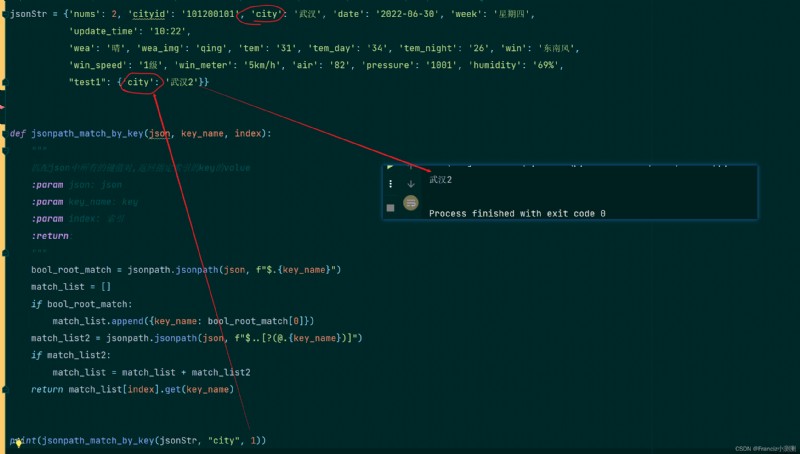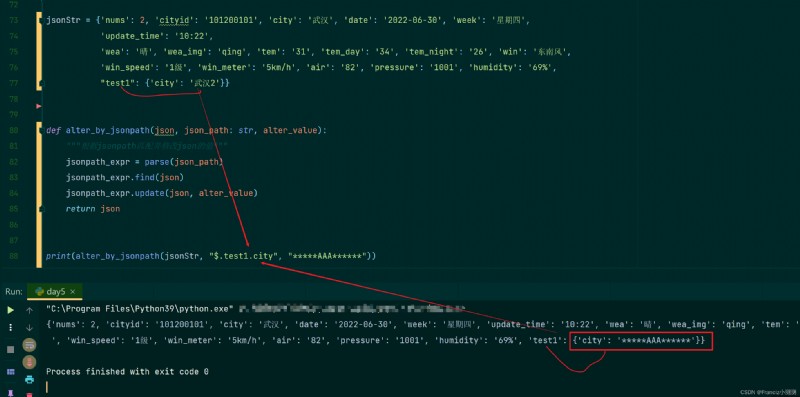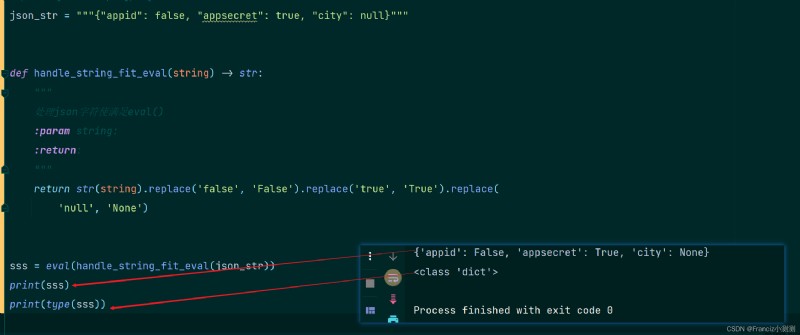To achieve the effect of

def send_requests(method, url, request_data, headers=None):
""" :param method: :param url: :param request_data: :param headers: :return: The response object """
print(" launch HTTP request ")
# Convert the request data into a dictionary object .
print(f" The request header is :{
headers}")
print(" The request method is :{}".format(method))
print(" request url by :{}".format(url))
# The replacement of double quotation marks is to facilitate the verification of data in third-party tools
request_data_info = str(request_data).replace("'", '"')
print(f" Request data is :{
request_data_info}")
method = str(method).lower() # Lowercase processing
if method == "get":
# request_date For the dictionary
request_result = requests.get(url=url, params=request_data, headers=headers)
elif method == "post_params":
# Handle post I won't support it json The situation of ,request_date For the dictionary
request_result = requests.post(url=url, params=request_data, headers=headers)
else:
# post request_date by json
request_result = requests.post(url=url, json=request_data, headers=headers)
# Return response object
return request_result
weather_api = {
"method": "get",
"url": "https://v0.yiketianqi.com/free/day",
"params": {
"appid": "83791773",
"appsecret": "a8UpKWz2",
"city": " wuhan "
}}
print(send_requests(weather_api["method"], weather_api["url"], weather_api["params"]).json())
json_str = """{"appid": "83791773", "appsecret": "a8UpK23Wz2", "city": " wuhan "}"""
# Qualified characters turn dict
print(type(eval(json_str)))
json_str = {
"appid": "83791773", "appsecret": "a8UpK312Wz2", "city": " wuhan "}
# dict turn json
json_str = json.dumps(json_str)
print(json_str, type(json_str))
# Character conversion json object
json_str = """{"appid": "83791773", "appsecret": "a8UpK213Wz2", "city": " wuhan "}"""
json_str = json.loads(json_str)
print(json_str)
pip install jsonpath
jsonStr = {
'nums': 2, 'cityid': '101200101', 'city': ' wuhan ', 'date': '2022-06-30', 'week': ' Thursday ',
'update_time': '10:22',
'wea': ' Fine ', 'wea_img': 'qing', 'tem': '31', 'tem_day': '34', 'tem_night': '26', 'win': ' Southeast wind ',
'win_speed': '1 level ', 'win_meter': '5km/h', 'air': '82', 'pressure': '1001', 'humidity': '69%',
"test1": {
'city': ' wuhan 2'}}
def jsonpath_match_by_key(json, key_name, index):
""" matching json All key value pairs in , Returns... Of the specified index key Of value :param json: json :param key_name: key :param index: Indexes :return: """
bool_root_match = jsonpath.jsonpath(json, f"$.{
key_name}")
match_list = []
if bool_root_match:
match_list.append({
key_name: bool_root_match[0]})
match_list2 = jsonpath.jsonpath(json, f"$..[?(@.{
key_name})]")
if match_list2:
match_list = match_list + match_list2
return match_list[index].get(key_name)
print(jsonpath_match_by_key(jsonStr, "city", 1))

Mainly used here jsonpath Filter expression implementation , For details, you can baidu
pip install jsonpath_ng
jsonStr = {
'nums': 2, 'cityid': '101200101', 'city': ' wuhan ', 'date': '2022-06-30', 'week': ' Thursday ',
'update_time': '10:22',
'wea': ' Fine ', 'wea_img': 'qing', 'tem': '31', 'tem_day': '34', 'tem_night': '26', 'win': ' Southeast wind ',
'win_speed': '1 level ', 'win_meter': '5km/h', 'air': '82', 'pressure': '1001', 'humidity': '69%',
"test1": {
'city': ' wuhan 2'}}
def alter_by_jsonpath(json, json_path: str, alter_value):
""" according to jsonpath Match and modify json Value """
jsonpath_expr = parse(json_path)
jsonpath_expr.find(json)
jsonpath_expr.update(json, alter_value)
return json
print(alter_by_jsonpath(jsonStr, "$.test1.city", "*****AAA******"))

json The string of cannot be used eval turn dict, Generally because json There are several special values in false,true,null
And in the python These are all capitalized ,null The corresponding is None
json_str = """{"appid": false, "appsecret": true, "city": null}"""
def handle_string_fit_eval(string) -> str:
""" Handle json Character satisfaction eval() :param string: :return: """
return str(string).replace('false', 'False').replace('true', 'True').replace(
'null', 'None')
sss = eval(handle_string_fit_eval(json_str))
print(sss)
print(type(sss))

